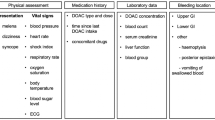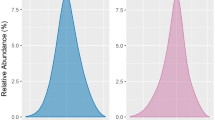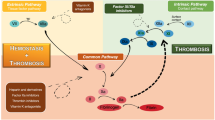Abstract
The vitamin K antagonists (VKAs) have been the standard (and only) oral anticoagulants used for the long-term treatment or prevention of venous thromboembolism or stroke in patients with atrial fibrillation. The coagulopathy induced by VKAs can be reversed with vitamin K, and in urgent situations, the vitamin K-dependent coagulation factors can be replaced by transfusion. In the last decade, a new class of oral anticoagulants has been developed, direct oral anticoagulants that bind to a specific coagulation factor and neutralize it. These compounds were shown to be effective and safe compared with the VKAs and were licensed for specific indications, but without a specific reversal agent. The absence of a reversal agent is a barrier to more widespread use of these agents. Currently, for the management of major life-threatening bleeding with the direct oral anticoagulants, most authorities recommend the use of four factor prothrombin complex concentrates. There are now three reversal agents in development and poised to enter the market. Idarucizumab is a specific antidote targeted to reverse the direct thrombin inhibitor, dabigatran, which was recently approved for use in the USA. Andexanet alfa is an antidote targeted to reverse the oral direct factor Xa inhibitors as well as the indirect inhibitor enoxaparin. Ciraparantag is an antidote targeted to reverse the direct thrombin and factor Xa inhibitors as well as the indirect inhibitor enoxaparin.



Similar content being viewed by others
References
Guyatt GH, Akl EA, Crowther M, Gutterman DD, Schuunemann HJ, for the American College of Chest Physicians Antithrombotic Therapy and Prevention of Thrombosis Panel. Antithrombotic therapy and prevention of thrombosis, 9th ed: American College of Chest Physicians Evidence-Based Clinical Practice Guidelines. Chest 2012;141(No. 2 Suppl):e1S–e801S.
Budnitz DS, Lovegrove MC, Shehab N, Richards CL. Emergency hospitalizations for adverse drug events in older Americans. N Eng J Med. 2011;365:2002–12.
Budnitz DS, Shehab N, Kegler SR, Richards CL. Medication use leading to emergency department visits for adverse drug events in older adults. Ann Intern Med. 2007;147:755–65.
Shepherd G, Mohorn P, Yacoub K, May DW. Adverse drug reaction deaths reported in United States Vital Statistics, 1999–2006. Ann Pharmacother. 2012;46:169–75.
Ansell J, Hirsh J, Hylek E, Jacobson A, Crowther M, Palareti G. The pharmacology and management of the vitamin K antagonists: ACCP evidence-based clinical practice guidelines. Chest. 2008;133:160S–98S.
Weitz JI, Eikelboom JW, Samama MM. New antithrombotic drugs: antithrombotic therapy and prevention of thrombosis, 9th ed: American College of Chest Physicians Evidence-Based Clinical Practice Guidelines. Chest. 2012;141(2_suppl):e120S–151S.
Chai-Adisaksopha C, Crowther M, Isayama T, Lim W. The impact of bleeding complications in patients receiving target-specific oral anticoagulants: a systematic review and meta-analysis. Blood. 2014;124:2450–8.
Skaistis J, Tagami T. Risk of fatal bleeding in episodes of major bleeding with new oral anticoagulants and vitamin K antagonists: a systematic review and meta-analysis. PLoS One. 2015;. doi:10.1371/journal.pone.0137444.
Majeed A, Hwang HG, Connolly SJ, Eikelboom JW, Ezekowitz MD, Wallentin L, Brueckmann M, Fraessdorf M, Yusuf S, Schulman S. Management and outcomes of major bleeding during treatment with dabigatran or warfarin. Circulation. 2013;128:2325–32.
Piccini JP, Garg J, Patel MR, Lokhnygina Y, Goodman SG, Becker RC, Berkowitz SD, Breithardt G, Hacke W, Halperin JL, Hankey GJ, Nessel CC, Mahaffey KW, Singer DE, Califf RM, Fox KAA. Management of major bleeding events in patients treated with rivaroxaban vs. warfarin: results from the ROCKET AF trial. Eur Heart J. 2014;35:1873–80.
Costin J, Ansell J, Laulicht B, Bakhru S, Steiner S. Reversal agents in development for the new oral anticoagulants. Postgrad Med. 2014;126:19–24.
Stanworth SJ, Hyde CJ, Murphy MF. Evidence for indications of fresh frozen plasma. Transfus Clin Biol. 2007;14:551–6.
Sokolovic M, Pastores SM. Transfusion therapy and acute lung injury. Expert Rev Respir Med. 2010;4:387–93.
Holbrook A, Schulman S, Witt DM, et al. Evidence-based management of anticoagulant therapy: antithrombotic therapy and prevention of thrombosis, 9th ed: American College of Chest Physicians Evidence-Based Clinical Practice Guidelines. Chest. 2012;141(2 Suppl):e152S–84S.
Khorsand N, Kooistra HAM, van Hest RM, Veeger NJGM, Meijer K. A systematic review of prothrombin complex concentrate dosing strategies to reverse vitamin K antagonist therapy. Thromb Res. 2014;135:9–19.
Sarode R, Milling TJ, Refaai MA, Mangione A, Schneider A, Durn BL, Goldstein JN. Efficacy and Safety of a 4-factor prothrombin complex concentrate in patients on vitamin K antagonists presenting with major bleeding: a randomized, plasma-controlled, phase IIIb study. Circ. 2013;128:1234–43.
Grottke O, Braunschweig T, Spronk HMH, Esch S, Rieg AD, van Oerle R, ten Cate H, Fitzner C, Tolba R, Rossaint R. Increasing concentrations of prothrombin complex concentrate induce DIC in a pig model of coagulopathy with blunt liver injury. Blood. 2011;118:1943–51.
Dusel CH, Grundmann C, Eich S, Seitz R, König H. Identification of prothrombin as a major thrombogenic agent in prothrombin complex concentrates. Blood Coagul Fibrinolysis. 2004;15:405–11.
Dentali F, Marches C, Pierfranceschi MG, Crowther M, Garcia D, Hylek E, Witt DM, Clark NP, Squizzato A, Imberti D, Ageno W. Safety of prothrombin complex concentrates for rapid anticoagulation reversal of vitamin K antagonists. Thromb Haemost. 2011;106:429–38.
Quinlan DJ, Eikelboom JW, Weitz JI. Four-factor prothrombin complex concentrate for urgent reversal of vitamin K antagonists in patients with major bleeding. Circ. 2013;128:1179–81.
Roldan V, Marin F. Pro: antidote for new anticoagulants—specific target of inhibition requires a specific target for neutralisation. Thromb Haemost. 2012;108:621–2.
Eerenberg ES, Levi M, Buller HR. Contra: antidotes for novel anticoagulants—do we really need them. Thromb Haemost. 2012;108:623–4.
Miller MP, Trujillo TC, Nordenholz KE. Practical considerations in emergency management of bleeding in the setting of target-specific oral anticoagulants. Am J Emerg Med. 2014;32:375–82.
Eerenberg ES, Kamphuisen PW, Sijpkens MK, Meijers JC, Buller HR, Levi M. Reversal of rivaroxaban and dabigatran by prothrombin complex concentrate. A randomized, placebo-controlled, crossover study in healthy subjects. Circulation. 2011;124:1573–9.
Marlu R, Hodaj E, Paris A, Albaladejo P, Crackowski JL, Pernod G. Effect of non-specific reversal agents on anticoagulant activity of dabigatran and rivaroxaban. Thromb Haemost. 2012;108:217–24.
Fukuda T, Honda Y, Kamisato C, Morishima Y, Shibano T. Reversal of anticoagulant effects of edoxaban, an oral, direct factor Xa inhibitor, with haemostatic agents. Thromb Haemost. 2012;107:253–9.
Honickel M, Braunschweig T, van Ryn J, ten Cate H, Spronk HMH, Rossaint R, Grottke O. Prothrombin complex concentrate is effective in treating the anticoagulant effects of dabigatran in a porcine polytrauma model. Anesthesiology. 2015;123:1350–61.
Honickel M, Maron B, van Ryn L, Braunschweig T, ten Cate H, Spronk HMH, Rossaint R, Grottke O. Therapy with activated prothrombin complex concentrate is effective in reducing dabigatran-associated blood loss in a porcine polytrauma model. Thromb Haemost. 2015. doi:10.1160/TH15-03-0266 (publish online Sep 3).
van Ryn J, Schure J, Kink-Eiband M, Clemens A. Reversal of dabigatran-induced bleeding by coagulation factor concentrates in a rat-tail bleeding model and lack of effect on assays of coagulation. Anesthesiology. 2014;120:1429–40.
Dickneite G, Hoffman M. Reversing the new oral anticoagulants with prothrombin complex concentrates (PCCs): what is the evidence? Thromb Haemost. 2014;111:189–98.
Perzhorn E, Gruber A, Tinel H, Marzec LM, Buetehorn U, Buchmueller A, Heitmeier S, Laux V. Reversal of rivaroxaban anticoagulation by haemostatic agents in rats and primates. Thromb Haemost. 2013;110:162–72.
Lambourne MD, Eltringham-Smith LJ, Gataiance S, Arnold DM, Crowther MA, Sheffield WP. Prothrombin complex concentrates reduce blood loss in murine coagulopathy induced by warfarin, but not in that induced by dabigatran etexilate. J Thromb Haemost. 2012;10:1830–40.
Pragst I, Zeitler SH, Doerr B, Kaspereit FJ, Herzog E, Dickneite G, van Ryn J. Reversal of dabigatran anticoagulation by prothrombin complex concentrate (Beriplex P/N) in a rabbit model. J Thromb Haemost. 2012;10:1841–8.
Dinkelaar J, Molenaar PJ, Ninivaggi M, de Laat B, Brinkman JM, Leyte A. In vitro assessment, using thrombin generation, of the applicability of prothrombin complex concentrate as an antidote for rivaroxaban. J Thromb Haemost. 2013;11:1111–8.
Zahir H, Brown KS, Vandell A, Desai M, Maa JF, Dishy V, Lomeli B, Feussner A, Feng W, He L, Grosso MA, Lanz HJ, Antman EM. Edoxaban effects on bleeding following punch biopsy and reversal by a 4-factor prothrombin complex concentrate. Circulation. 2014;131:82–90.
Jackson LR, Becker RC. Novel oral anticoagulants: pharmacology, coagulation measures, and considerations for reversal. J Thromb Thrombolysis. 2014;37:380–91.
Siegal DM. Managing target-specific oral anticoagulant associated bleeding including an update on pharmacological reversal agents. J Thromb Thrombolysis. 2015;39:395–402.
Kaatz S, Kouides PA, Garcia DA, Spyropoulos AC, Crowther M, Douketis JD, Chan AKC, James A, Moll S, Ortel TL, van Cott EM, Ansell J. Guidance on the emergent reversal of oral thrombin and factor Xa inhibitors. Am J Hematol. 2012;87:S141–5.
Miesbach W, Seifried E. New direct oral anticoagulants-current therapeutic options and treatment recommendations for bleeding complications. Thromb Haemost. 2012;108:625–32.
Schiele F, van Ryn J, Canada K, Newsome C, Sepuveda E, Park J, Nar J, Litzenburger T. A specific antidote for dabigatran: functional and structural characterization. Blood. 2013;121:3554–62.
Glund S, Stangier J, Schmohl M, De Smet M, Gansser D, Lang B, Moschetti V, Ramael S, Reilly PA. A specific antidote for dabigatran: immediate, complete and sustained reversal of dabigatran induced anticoagulation in healthy male volunteers. Circulation. 2013;128:A17765.
Pollack CV, Reilly PA, Eikelboom J, Glund S, Verhamme P, Bernstein RA, Dubiel R, Huisman MV, Hylek EM, Kapmhusien PW, Kreuzer J, Levy JH, Sellke FW, Stangier J, Steiner T, Wang B, Kam CW, Weitz JI. Idarucizumab for dabigatran reversal. N Engl J Med. 2015;373:511–20.
Grottke O, Honickel M, van Ryn J, ten Cate H, Rossaint R, Sprink HM. Idarucizumab, a specific dabigatran reversal agent, reduces blood loss in a porcine model of trauma with dabigatran anticoagulation. J Am Coll Cardiol. 2015;66:1518–9.
Praxbind package insert. http://us.boehringer-ingelheim.com/content/dam/internet/opu/us_EN/documents/Media_Press_Releases/2015/Praxbind.pdf. Accessed 20 Nov 2015.
Lu G, DeGuzman FR, Hollenbach SJ, Karbarz MJ, Abe K, Lee G, Luan P, Hutchaleelaha A, Inagaki M, Conley PB, Phillips DR, Sinha U. A specific antidote for reversal of anticoagulation by direct and indirect inhibitors of coagulation factor Xa. Nat Med. 2013;19:446–51.
Shah N, Rattu MA. Reversal agents for anticoagulants: focus on andexanet alfa. Am Student Res J. 2014;1:16–28.
Crowther M, Vandana M, Michael K, Genmin L, Conley PB, Hollenbach S, Castillo J, Hutchaleelaha A, Karbarz M, Lin JP, Barron L, Russell S, Levy GG, Connolly S, Curnutte JT. A phase 2 randomized, double-blind, placebo-controlled trial demonstrating reversal of rivaroxaban-induced anticoagulation in healthy subjects by andexanet alfa, an antidote for FXa inhibitors. Blood. 2013;122:3636 (abstract).
Siegal DM, Curnutte JT, Connolly SJ, Lu G, Conley PB, Wiens BL, Mathur VS, Castillo J, Bronson MD, Leeds JM, Mar FA, Gold A, Crowther MA. Andexanet alfa for the reversal of factor Xa inhibitor activity. N Engl J Med. 2015;373:511–520. doi:10.1056/NEJMoa1510991.
Gold AM, Crowther M, Levy G, Lu G, Leeds J, Barron L, Conley P, Castillo J, Curnutte J, Connolly S. ANNEXA™-R: a phase 3 randomized, double-blind, placebo-controlled trial demonstrating reversal of rivaroxaban-induced anticoagulation in older subjects by andexanet alfa, a universal antidote for factor Xa inhibitors. JACC. 2015;65:A23 (abstract).
Crowther M, Gold A, Lu G, Leeds JM, Wiens BL, Mathur V, Castillo J, Conley PB, Connolly S, Curnutte JT. ANNEXA-A Part 2: a phase 3 randomized, double-blind, placebo-controlled trial demonstrating sustained reversal of apixaban-induced anticoagulation in older subjects by andexanet alfa, a universal antidote for factor Xa inhibitors. J Thromb Haemost. 2015;13(Suppl 2):84 (LB004 abstract).
Crowther M, Lu G, Conley P, Leeds J, Castillo J, Levy G, Connolly S, Curnutte J. Reversal of factor Xa inhibitors-induced anticoagulation in healthy subjects by andexanet alfa. Crit Care Med 2014;42:pA1469.
Laulicht B, Bakhru S, Jiang X, et al. Antidote for new oral anticoagulants: mechanism of action and binding specificity of PER977. Presented at the 24th Congress of the International Society on Thrombosis and Haemostasis, Amsterdam, June 29–July 4. 2013. Abstract (http://www.eventure-online.com/eventure/publicAbstractView.do?id=226718&congressId=6839). Accessed 27 Jan 2016.
Bakhru S, Laulicht B, Jiang X, Chen I, Pan D, Grosso M, Morishima Y, Brown K, Masumoto H, Costin J, Steiner S. PER977: a synthetic small molecule which reverses over-dosage and bleeding by the new oral anticoagulants. Circ. 2013;128:A18809 (abstract).
Bakhru S, Laulicht B, Jiang X, Chen L, Grosso M, Morishima Y, Brown K, Mercuri M, Masumoto H, Costin J, Steiner S. Reversal of anticoagulant-induced bleeding in external and internal bleeding models by PER977, a small molecule anticoagulant antidote. Circ. 2014;130:A19361 (abstract).
Ansell JE, Bakhru S, Laulicht BE, Steiner SS, Grosso M, Brown K, Dishy V, Noveck RJ. Use of PER977 to reverse the anticoagulant effect of edoxaban. N Eng J Med. 2014;2014(339):2141–2.
Laulicht B, Bakhru S, Steiner S, Brown K, Grosso M, Lanz H, Mercuri M, Costin J. PER977 (ciraparantag) reverses edoxaban anticoagulation at steady state and has no effect on re-anticoagulation at the next scheduled dose [Abstract No. 4971]. Eur Heart J 2015;36(Abstract Supplement):859–60.
Costin J, Laulicht B, Bakhru S, Laulicht B, Steiner S. PER977 reverses low molecular weight heparin in addition to IIa and Xa new oral anticoagulants. J Am Coll Cardiol. 2015:65(10_S)(abstract). doi:10.1016/S0735-1097/(15)62056-3.
Costin J, Ansell J, Bakhru S, Laulicht B, Solomon S. The new oral anticoagulants: clinical use and reversal agent development. ISBT Science Series. 2015;10(Suppl 1):324–31.
Author information
Authors and Affiliations
Corresponding author
Ethics declarations
Disclosures
Dr. Ansell reports consultant activities and honoraria from Boehringer Ingelheim, Bristol Myers Squibb, Pfizer, Janssen, and Daiichi Sankyo. Dr. Ansell is a member of the Scientific Advisory Board for Perosphere and has equity interest in Perosphere.
Rights and permissions
About this article
Cite this article
Ansell, J.E. Reversing the Effect of Oral Anticoagulant Drugs: Established and Newer Options. Am J Cardiovasc Drugs 16, 163–170 (2016). https://doi.org/10.1007/s40256-016-0162-7
Published:
Issue Date:
DOI: https://doi.org/10.1007/s40256-016-0162-7




